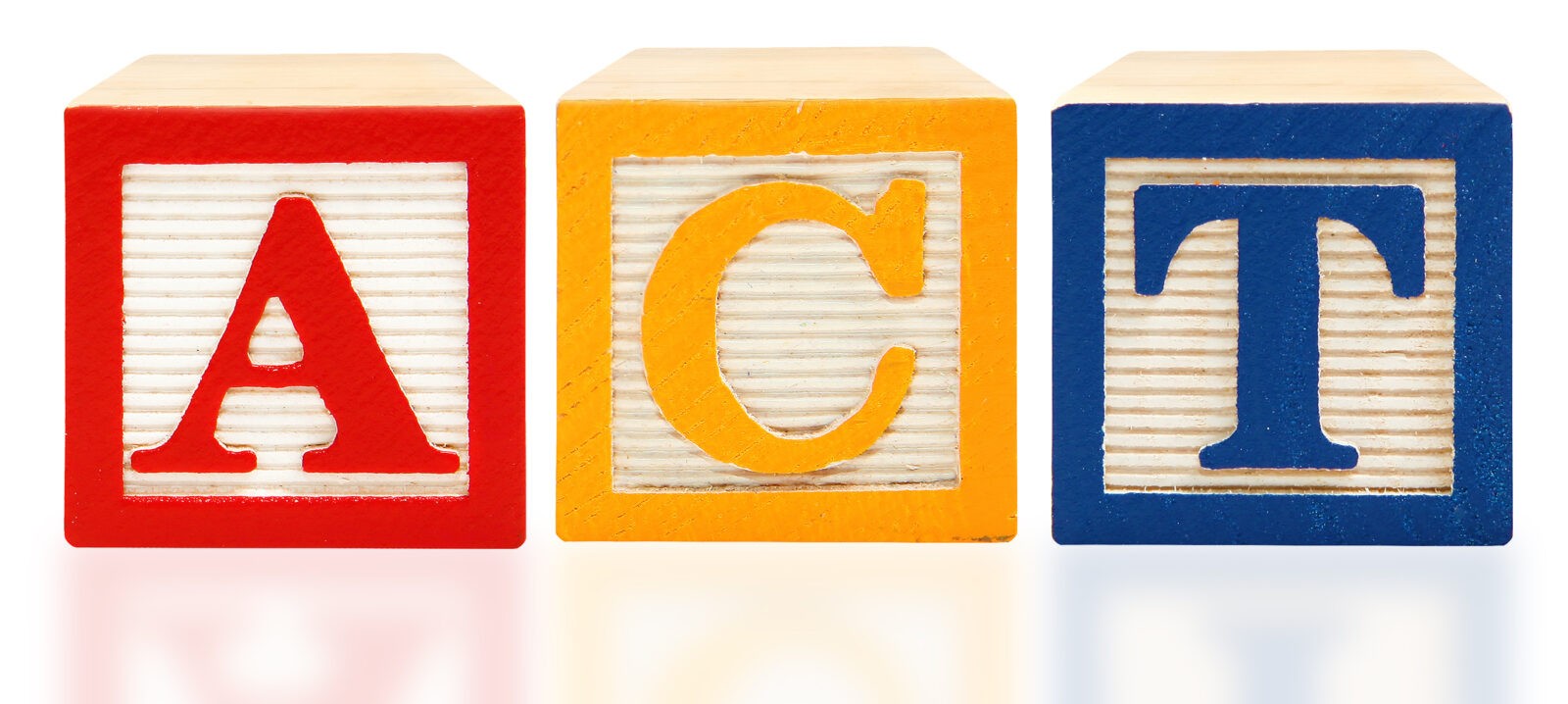The Changes
First of all, ACT is calling them ‘enhancements,’ rather than changes. However, I think that we’re safe to continue calling them changes for the purposes of this blog post. There will be several significant changes to the format of the ACT:
-
-
- Science section will be optional
-
- Shorter by about an hour
-
- Fewer questions
-
- More time per question
-
- Choice to take the test on a computer or on paper
-
- No fifth section
-
- Four answer choices instead of five on the Math section
-
- Shorter passages on Reading and English sections
-

Science Section Will Be Optional
For decades, the biggest apparent difference between the SAT and the ACT has been the presence of the Science section on the ACT. The SAT has no equivalent section; it does include some graphs and tables in the Reading & Writing section, but these are hardly the same as a full Science section.
Starting in 2025, however, the tests will be getting more similar to each other, as the ACT is making the Science section optional rather than mandatory. Even for students who do take the optional Science section, it will not be included as part of the overall Composite score. Instead, they will receive a separate STEM score that is an average of the Math and Science section scores.
Shorter test

As the table above shows, the new version of the test will be shorter by 50 minutes for students who do not take the optional Science section. For students who do take the optional Science section, it will be 10 minutes shorter. For students who do not take the optional Science section, this length is similar to the current SAT length of 2 hours & 14 minutes.
Fewer Questions

As this table shows, all of the mandatory sections have fewer questions on the new ACT than on the old ACT. For those not taking the optional Science section, this is almost a 40% reduction in the total number of questions.
More Time per Question

Students now receive more time per question on all sections of the ACT, as shown in the table above. The biggest change is on the Reading section, where the amount of time per question will increase by 27 percent.
Choice to Take the Test on a Computer or on Paper
This part is still somewhat unclear, but it seems to be the case that students will get the choice of taking the new ACT on paper or on a computer. Once the new version of the test is fully rolled out by the end of 2025, the format of the tests will be the same on paper and on the computer; students will simply have the choice of which modality they prefer.
There have been some rumors that ACT is eventually going to fully switch to a computer- based modality (as SAT has done). For now, though, we are operating on the assumption that ACT will continue to allow students to choose their modality. On the website for these ‘enhancements,’ ACT lists one comment that they heard from students as being “I don’t want to test on a computer. I still want paper.” Their response is “The choice is still theirs! The ACT is available via paper/pencil or online.” Questions about present tense versus future tense aside, it would be odd for ACT to advertise this and then rapidly remove the paper-based testing option. Thus, our best guess is that ACT is going to continue to offer the paper-based testing option indefinitely.
No Fifth Section
The ACT has historically used a fifth section to test questions for future tests. Not all students would receive this fifth section, but some would. It would typically consist of a shortened version of one of the other four sections. The proctor would not explicitly tell students that it did not count towards their scores, but many students knew this. They would therefore not put their full effort into this section, reducing the accuracy of the data that ACT was getting from these sections.
Going forward, no students will receive a fifth section. Instead, ACT will embed questions inside of the existing sections that do not count towards a student’s score. These will be the only questions that are being field tested for future test dates. Students will not be able to identify which questions these are, so they will have no choice but to put their full effort into these questions. This should yield better data for ACT, less confusion for students, and a shorter overall testing experience.
Four Answer Choices instead of Five on the Math Section
On the old ACT, the Math section has had five answer choices per question. They will be reducing this to have four answer choices per question on the new ACT. This will match the other sections of the ACT.
SAT has long had only four answer choices on its multiple-choice Math questions. However, SAT also has free-response Math questions along with the multiple-choice variety. ACT does not appear to be adopting any of these free response questions.
Shorter Passages
ACT has confirmed that the passages on the Reading and English sections will be shorter on the new test than on the old test. However, we don’t quite know what that will look like yet. It is unlikely that they will switch to the one-paragraph-length-passage-per-question model that SAT has adopted. Instead, we are still likely to see longer passages (relative to SAT) with several questions per passage. Because they have shortened the number of English questions to 50, it is possible that there will still be five longer passages on the English section; if this is true, each would now have 10 questions instead of the 15 questions per passage that are found on the old ACT.
Similarly, with 36 questions on the new Reading section, it is a logical guess that there might still be four total passages. Each would then have nine questions instead of the 10 questions per passage on the old ACT.
ACT has told us that these passages are shorter. Are they just “shorter” because they have fewer questions on them? Or do the passages truly contain lower word counts? We won’t know for sure until ACT clarifies this or releases a practice test.

Why is ACT Making these Changes?
By calling them ‘enhancements,’ ACT is trying to imply that the test is improving. From the perspective of a student’s test-day experience, this is likely true. The test will be shorter, especially if the student does not take the Science section, which means that the test feels less grueling and less unpleasant, and it means that each student gets more of his or her Saturday back to do other things. Additionally, having the choice between taking the test on paper and on a computer is a nice benefit, as it allows students to choose the modality that they prefer, further reducing the level of pain.
However, there is a sacrifice to this. Standardized tests are supposed to measure some underlying latent ability in college applicants. Generally, this latent ability can be thought of as ‘college readiness.’ By having fewer questions to measure this ability (and by decreasing the number of answer choices on the Math section), the statistical model that ACT uses (see our blog post on item-response theory) will have less information with which to estimate individuals’ ability levels. In practice, this means that ACT scores will likely become somewhat less reliable than they were in the past—there will be more fluctuation in a student’s scores from one test to the next even without any change in underlying ability.
When College Board shortened the SAT, they tried to compensate for this same phenomenon by adding an adaptive component to the SAT. Since ACT has explicitly stated that there will not be an adaptive component, there is really no way for them to mitigate this effect.
Given the positives (better testing experience for students) and the negatives (less reliable score measurement) of these changes, it is clear that ACT is putting greater emphasis on the testing experience for students. This is likely because students (and parents) are their consumers, and they are forced by market forces to take steps to try to retain/gain market share and compete with SAT. If shortening the test and allowing students to choose their modality encourages more students to take the ACT over the SAT, they will likely be willing to accept a bit less precision in score estimates.
The Timeline
The timeline is somewhat confusing, because there will be a portion of 2025 during which both versions of the test will be offered. The chart below shows the timeline. Please note that the “school day” tests are ones that schools offer during the school day to their students. Not all schools do this. Tests that are not labeled as “school day” are the regular Saturday tests for which students register through ACT’s website.

What We Are Still Waiting On
-
-
- Practice tests!!!!! ACT has yet to release any practice tests in this new format. While we suspect that the questions will look and feel very similar to the old test, we won’t have a definitive answer to this until we get to see an actual test
- Statements from colleges on how they will use the new ACT scores.
-
-
- Who will be required to take the Science section? All applicants? No applicants? Just applicants interested in majoring in a science-related field?
- If colleges do require the Science section, will they treat it as a separate component of the application, or will they ignore ACT’s new 3-section Composite score and re- calculate an old-school 4-section Composite score?
- Will colleges all adopt the same policies on these questions, or will it vary from college to college?
- Will they accept the existing concordance between ACT and SAT scores that was based on studies conducted in 2018 under old versions of both tests? Or will they require new concordance studies?
-
-
Our Recommendation
Until we get more information about the new ACT, get to actually see a practice test of it (or more than one, ideally), and hear how colleges are going to use it, we are not yet going to recommend the new ACT format for most students.
Students aiming for Spring 2025 for their standardized tests will still have viable dates to take the old format of the ACT. Therefore, our recommendation will be to take either the SAT or the old format of the ACT. We will essentially ignore the new format of the ACT.
Students testing later in 2025, however, will not have that luxury of ignoring the new format. We are going to recommend the SAT over the ACT for a much larger proportion of these students than we have in the past.
It doesn’t make sense to spend time, energy, and money preparing for an unknown quantity. If we get more information about the new format of the ACT, our recommendations could change. For now, though, we are recommending that most students avoid the new format of the ACT.
Interested in learning more about Test Prep at Mindfish?
Contact us today to find out what our dedicated tutors can help you achieve.





